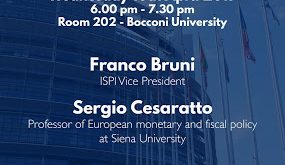Hatzius sees bigger risks in private debt than public deficit BofA, Standard Chartered say MMT only helps in sharp downturns BloombergWall Street Economists Wade Into the MMT Debate in a Big WayKatia Dmitrieva
Read More »Lars P. Syll — MMT perspectives on the euro
The cost of giving up currency sovereignty. Even Germany isn't doing well under the euro now. Lars P. Syll’s BlogMMT perspectives on the euroLars P. Syll | Professor, Malmo University
Read More »Pavlina Tcherneva — MMT, Models, Multidisciplinarity
I was hoping that Pavlina would bury Noah's criticism of her paper, and she greatly exceeded my expectations.MUST-READ. This is much more than a smackdown. Lotsa links, too.New Economic PerspectivesMMT, Models, MultidisciplinarityPavlina Tcherneva | Assistant Professor of Economics at Bard College, Research Scholar at The Levy Economics Institute, and Senior Research Associate at the Center for Full Employment and Price Stability
Read More »MMT, Models, Multidisciplinarity
By Pavlina R. Tcherneva The attacks on MMT are taking a comical turn. A recent one, courtesy of Noah Smith, takes aim at a paper I wrote in the 90s titled “Monopoly Money: The State as a Price Setter”. It focused on a key MMT idea—that the currency-issuing monopolist (just like any other monopolist) is a price setter. The economics that I was taught didn’t even consider the implications. So I wrote down a few equations to look at different scenarios of prices paid and real resources...
Read More »Maxximilian Seijo — A Response to Rebecca Spang’s “MMT and Why Historians Need to Reclaim Studying Money”
Historian Rebecca Spang’s latest History News Network piececon MMT and history is both timely and thought-provoking. In addition to its biting critique of economic orthodoxy and other valuable insights, the essay sets into relief a productive ontological debate about money and its historical manifestations. Part of the present breakdown of the neoliberal consensus, the insurgent popularity of MMT in contemporary discourse has enlivened conservations about the nature of money and its role in...
Read More »Nella fossa del leone, poi in Statale e a maggio Wray (MMT)
Patricia Cohen — Modern Monetary Theory Finds an Embrace in an Unexpected Place: Wall Street
Breaking a rule not to give the Times exposure for a variety of reasons since a pretty decent article on MMT appears in the "paper of record" in the Economy section. No doubt that many of the nay-sayers are upset by what amounts to Wall Street endorsement of the basic ideas of MMT, if not the all policy recommendations. But it's the basic ideas o MMT that make Wall Street money — Goldman's chief economist Jan Haztius uses them — not the policy proposals. Can't argue with success.New York...
Read More »Lars P. Syll — Job Guarantee and inflation control
Quote from the new MMT textbook, Macroeconomics, by Bill Mitchell, Randy Wray, and Matin Watts on the MMT JG that operates as a buffer stock and a price anchor. Lars P. Syll’s BlogJob Guarantee and inflation controlLars P. Syll | Professor, Malmo University
Read More »Bill Mitchell — The effectiveness and primacy of fiscal policy – Part 3
The objections to an independent fiscal authority – continued... Who needs more technocracy when "democracy" is already a shambles? Bill Mitchell – billy blog The effectiveness and primacy of fiscal policy – Part 3Bill Mitchell | Professor in Economics and Director of the Centre of Full Employment and Equity (CofFEE), at University of Newcastle, NSW, Australia
Read More »Gower Initiative for Modern Monetary Studies — The markets are not in charge, sovereign currency-issuing governments are
With human survival on the line the message needs to be loud, clear and repeated ad nauseam:The spending of a government like the UK which is a sovereign currency issuer is not constrained by its ability to collect tax. In other words, it is not like a household budget which needs income before it can spend. Whilst it is a good idea to review global corporate tax rules as a mechanism to redistribute wealth and resources more fairly Christine Lagarde’s claim that doing so will allow...
Read More » Heterodox
Heterodox

